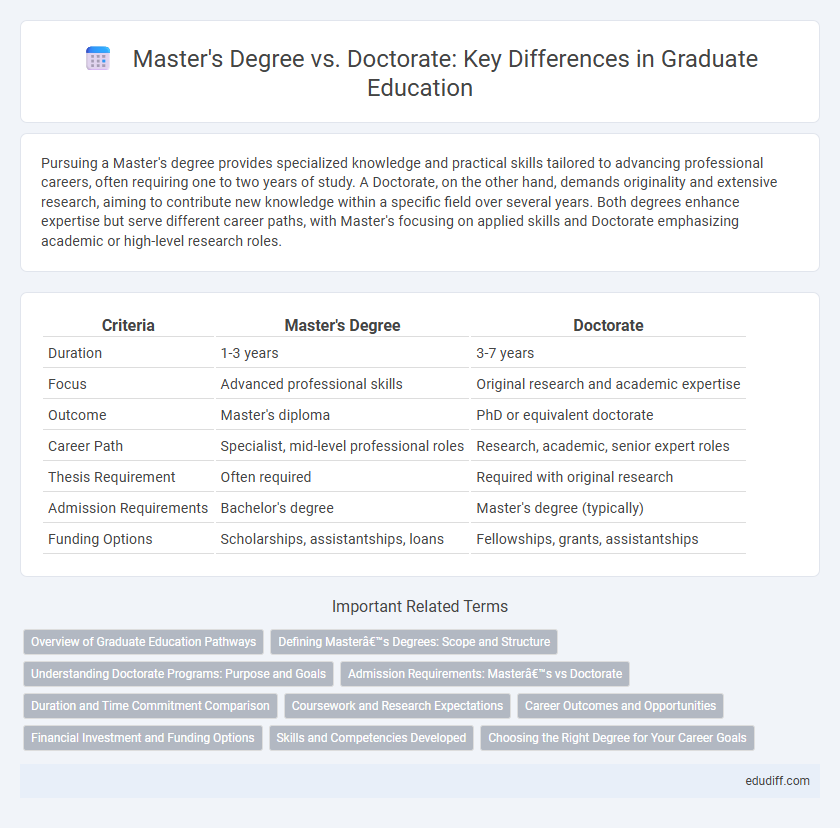Pursuing a Master's degree provides specialized knowledge and practical skills tailored to advancing professional careers, often requiring one to two years of study. A Doctorate, on the other hand, demands originality and extensive research, aiming to contribute new knowledge within a specific field over several years. Both degrees enhance expertise but serve different career paths, with Master's focusing on applied skills and Doctorate emphasizing academic or high-level research roles.
Table of Comparison
| Criteria | Master's Degree | Doctorate |
|---|---|---|
| Duration | 1-3 years | 3-7 years |
| Focus | Advanced professional skills | Original research and academic expertise |
| Outcome | Master's diploma | PhD or equivalent doctorate |
| Career Path | Specialist, mid-level professional roles | Research, academic, senior expert roles |
| Thesis Requirement | Often required | Required with original research |
| Admission Requirements | Bachelor's degree | Master's degree (typically) |
| Funding Options | Scholarships, assistantships, loans | Fellowships, grants, assistantships |
Overview of Graduate Education Pathways
Graduate education pathways include Master's degrees, typically requiring one to three years of advanced coursework and research, aimed at skill specialization and career advancement. Doctorate programs involve extensive original research culminating in a dissertation, often lasting four to six years, designed to develop expertise for academic, scientific, or professional leadership roles. Both pathways require a bachelor's degree for admission and offer distinct opportunities for intellectual growth and professional development.
Defining Master’s Degrees: Scope and Structure
Master's degrees typically encompass one to two years of advanced study beyond a bachelor's degree, focusing on specialized knowledge and practical skills in a specific field. Programs include coursework, research projects, and sometimes internships, designed to deepen professional expertise or prepare for doctoral studies. Common types are Master of Arts (MA), Master of Science (MS), and professional degrees like MBA, each tailored to distinct academic and career goals.
Understanding Doctorate Programs: Purpose and Goals
Doctorate programs aim to develop advanced expertise and original research skills, preparing candidates for careers in academia, research, and specialized professional fields. Unlike Master's degrees, which focus on broad theoretical knowledge and practical skills, doctorate studies emphasize contributing new knowledge through a dissertation or thesis. The primary goal is to cultivate independent scholars capable of advancing their discipline through innovative research and critical analysis.
Admission Requirements: Master’s vs Doctorate
Master's degree programs typically require a bachelor's degree with a minimum GPA, letters of recommendation, and a statement of purpose, emphasizing academic readiness and potential for advanced study. Doctorate admissions demand a master's degree or exceptional bachelor's credentials, extensive research experience, a detailed research proposal, and often require standardized test scores like the GRE. The rigorous selection process for doctoral programs prioritizes research aptitude, academic excellence, and alignment with faculty expertise.
Duration and Time Commitment Comparison
A Master's degree typically requires 1 to 3 years of full-time study, focusing on coursework and a thesis or project, whereas a Doctorate demands 3 to 7 years involving intensive research, dissertation, and often teaching responsibilities. The time commitment for a Doctorate is significantly higher due to the depth of study and original contribution to the field. Students pursuing a Doctorate should prepare for extended academic and research tasks beyond the timeframe of most Master's programs.
Coursework and Research Expectations
Master's degree programs emphasize advanced coursework combined with a research project or thesis, requiring students to demonstrate mastery of a specialized field through structured learning and applied research. Doctorate programs prioritize original research that contributes new knowledge to the field, demanding extensive dissertation work and often minimal coursework focused on research methodology and theory. The research expectations in a doctorate are significantly higher, involving rigorous hypothesis testing, data analysis, and publication, whereas master's programs focus more on comprehensive understanding and practical application.
Career Outcomes and Opportunities
Master's degrees often lead to advanced professional roles and increased earning potential in fields such as business, education, and healthcare, providing practical skills and industry connections for career advancement. Doctorate degrees, particularly PhDs, open pathways to research positions, university faculty roles, and specialized expert careers in science, technology, and academia, emphasizing innovation and original contributions. Employers value master's degrees for applied knowledge and leadership readiness, while doctorates are preferred for high-level research, strategic development, and scholarly influence.
Financial Investment and Funding Options
A Master's degree typically requires a lower financial investment, with average tuition ranging from $20,000 to $50,000, while a Doctorate can exceed $60,000 due to longer study duration and research expenses. Funding options for Master's programs often include scholarships, assistantships, and employer sponsorships, whereas Doctorate candidates have access to more extensive funding through research grants, teaching assistantships, and fellowships that may cover tuition and provide stipends. Carefully evaluating the return on investment and available financial support is crucial when deciding between pursuing a Master's degree or a Doctorate.
Skills and Competencies Developed
Master's degree programs emphasize advanced theoretical knowledge and practical skills, fostering critical thinking, specialized research, and professional expertise in a specific field. Doctorate programs build on this foundation by developing high-level research competencies, original contribution to knowledge, complex problem-solving, and leadership abilities in academia or industry. Both degrees enhance communication, analytical reasoning, and project management skills, with doctorates placing stronger emphasis on independent scholarship and innovation.
Choosing the Right Degree for Your Career Goals
Master's degrees provide specialized knowledge and practical skills designed to advance careers in fields like business, education, or healthcare, often requiring 1-3 years of study. Doctorate programs emphasize original research and academic scholarship, preparing candidates for roles in academia, research, or advanced professional practice, typically taking 4-7 years to complete. Aligning your degree choice with specific career objectives--whether immediate professional advancement or long-term research leadership--maximizes educational and occupational outcomes.
Master’s Degree vs Doctorate Infographic

 edudiff.com
edudiff.com